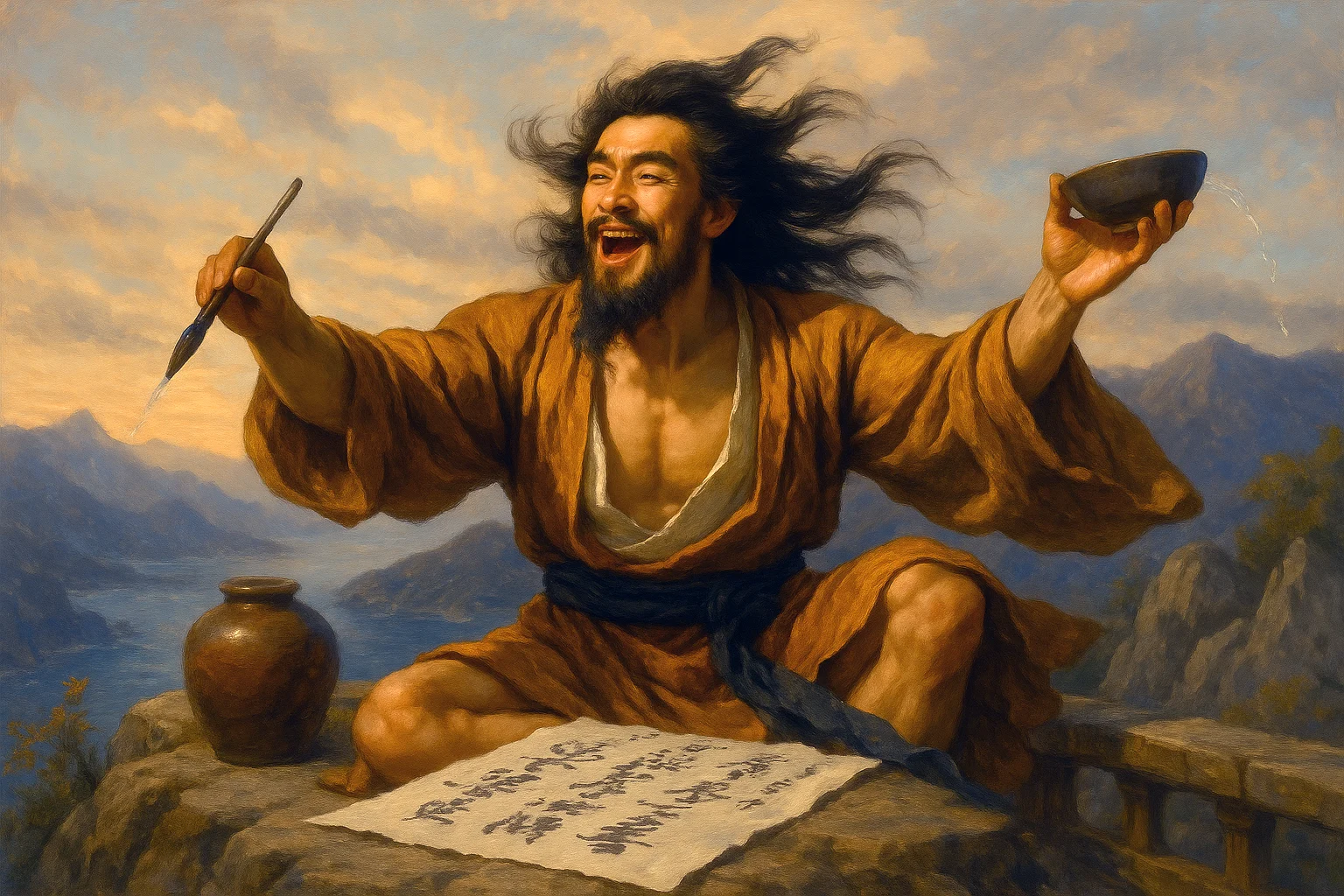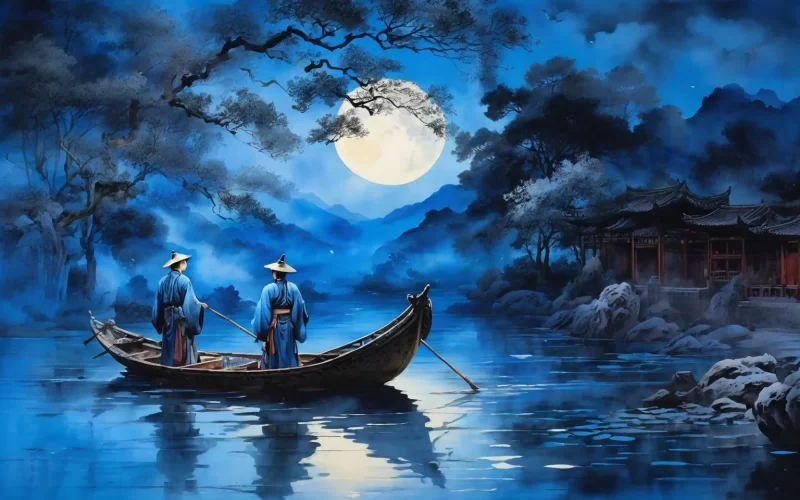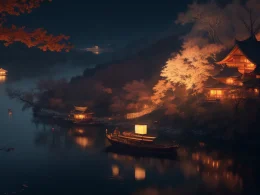EI viajero, sentado junto a un remo,
oye cantar a los labriegos en el ocaso
Ríe, jugueteando con la luna del arroyo;
Quiere recoger más brlllos en las manos.
Texto original
「清溪泛舟」
张旭
旅人倚征棹,薄暮起劳歌。
笑揽清溪月,清辉不厌多。
Antigua práctica
Ce poème est l'œuvre du célèbre calligraphe Zhang Xu (张旭), maître de l'écriture cursive. Bien que principalement connu pour sa calligraphie, ses poèmes présentent également un style libre et élégant. Ce poème décrit une promenade en barque sur une rivière claire au crépuscule lors d'un voyage, avec des traits simples mais une atmosphère vivante. Surnommé "le Sage de la Cursive", Zhang Xu possède un style poétique souvent débridé et lyrique. Dans ce court poème, il crée une image émouvante avec une économie de mots, révélant tout son charme et son esprit.
Premier couplet : « 旅人倚征棹,薄暮起劳歌。 »
Lǚ rén yǐ zhēng zhào, bó mù qǐ láo gē.
"Le voyageur s'appuie sur sa rame, au crépuscule s'élève le chant des bateliers."
Ce couplet d'ouverture établit le cadre temporel et l'état du personnage. Au crépuscule, sur l'eau, le poète-voyageur s'appuie nonchalamment sur sa rame. Soudain, les chants rythmés et puissants des bateliers brisent le silence de la rivière. Non seulement cela crée une dynamique du voyage, mais à travers ces "chants de labeur", il insuffle au poème un rythme de vie et une musicalité. Le voyageur n'est plus seul, et l'univers entier semble s'animer avec ces chants.
Deuxième couplet : « 笑揽清溪月,清辉不厌多。 »
Xiào lǎn qīng xī yuè, qīng huī bù yàn duō.
"En riant, il embrasse la lune dans la rivière claire, jamais las de cette pure clarté lumineuse."
Ce couplet est d'une grande force visuelle et romantique. Sous la nuit éclairée par la lune qui baigne la rivière limpide, le poète, ému par cette beauté, se penche en riant pour "saisir la lune". Ce geste romantique est bien plus qu'une fantaisie - c'est l'extériorisation d'une émotion, la fusion profonde entre l'âme du poète et la nature. La dernière ligne "jamais las de cette pure clarté" exprime avec un rire gourmand son amour insatiable pour la beauté naturelle, révélant aussi son tempérament libre, passionné et sans contraintes.
Análisis Integral
Con apenas veinte caracteres, este poema logra abarcar múltiples dimensiones: personajes, entorno, sonidos y emociones, convirtiéndose en un modelo de brevedad magistral. El poeta toma como escenario un atardecer durante un viaje, trazando con trazos mínimos una imagen donde se fusionan escena y sentimiento, quietud y movimiento: una barca navegando por el arroyo, un hombre reclinado en el remo escuchando cantos, que de pronto ríe al intentar atrapar la luna en el agua. Aquí conviven el canto rudo de los trabajadores y el espíritu libre del literato, creando entre lo dinámico y lo estático un microcosmos de singular encanto. El momento culminante —"reír al atrapar la luna clara del arroyo"— no solo destaca por su imagen novedosa, sino que rebosa del deleite del poeta en la naturaleza y su trascendencia de lo mundano, reflejando vívidamente el carácter "extravagante y libre" de Zhang Xu manifestado en versos.
Recursos Estilísticos
Aunque breve, este poema muestra una composición ingeniosa, lenguaje depurado y espíritu vibrante. El uso del contraste dinámico, empleando el "canto de trabajo" para resaltar la quietud de "reclinarse en el remo", intensifica el ritmo y crea efectos antitéticos. La fusión escénico-emocional teje arroyo, luna, barca y risa en un cuadro conmovedor donde paisaje y ánimo se funden. Su lenguaje desenfadado pero elegante, con expresiones como "reír al atrapar" o "no cansarse de su fulgor", revela el carácter audaz de Zhang Xu mientras mantiene refinamiento. La obra fluye con naturalidad sin ataduras formales, demostrando el arte tang de "vencer con lo escaso", donde lo minimalista alcanza máxima expresividad.
Reflexiones
"En una Barca en el Arroyo Cristalino" domina lo complejo con simplicidad y pinta el paisaje mediante la emoción, mostrándonos cómo el poeta halla alegría y consuelo vital en el diálogo entre el fluir natural y el alma. Nos enseña que incluso en travesías arduas podemos descubrir belleza y abrazarla —hasta una luna en el arroyo merece ser atrapada entre risas—. "No cansarse de su fulgor" trasciende el encanto poético: es una actitud sincera de amar la vida y valorar lo natural. En este espíritu libre y despreocupado, el poeta se complace con el universo mientras su ser halla paz.
Traductor
Chen Guojian(陈国坚)
À propos du poète

Zhang Xu (张旭, env. 675-750), originaire de Suzhou dans le Jiangsu, fut un calligraphe et poète de l'âge d'or des Tang. Célèbre pour sa maîtrise de l'écriture cursive (草书 ), il fut honoré du titre de "Sage de la Cursive" (草圣 cǎoshèng). Seuls six de ses poèmes nous sont parvenus.Grand amateur de vin et virtuose de la cursive folle, il fusionnait dans sa création artistique poésie, calligraphie et ivresse, incarnant l'esprit romantique de l'apogée tang. Son influence sur l'art lettré postérieur reste incommensurable.












